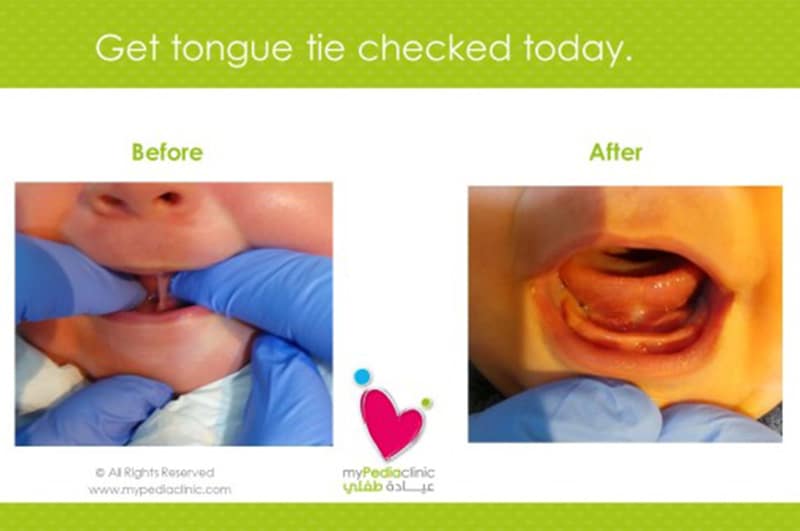Tongue Tie Diagnosis and Treatment in Dubai: Expert Guide by Dr. Medhat Abu-Shaaban
If you’ve been around breastfeeding mothers or in parenting circles in Dubai, you’ve likely heard the term “tongue tie” mentioned. Despite its prevalence, tongue tie remains one of the most frequently missed conditions affecting newborns and infants, often leading to premature cessation of breastfeeding, feeding difficulties, and long-term developmental concerns. At myPediaClinic in Dubai Healthcare City, voted the best pediatric clinic in Dubai, we specialize in diagnosing and treating tongue ties using the latest techniques.
Many parents whose children have tongue tie never discover the true cause of their breastfeeding challenges, experiencing weeks or months of pain and frustration before giving up on breastfeeding entirely. The unfortunate reality is that most pediatricians don’t routinely check for tongue tie, and even when they do, subtle posterior tongue ties can easily be missed without proper expertise.
This comprehensive guide, developed by Dr. Medhat Abu-Shaaban, pediatrician and tongue tie expert in Dubai, will help you understand everything about tongue tie—from identification and diagnosis to treatment options and post-release care.
What is a Tongue Tie (Ankyloglossia)?
A normal tongue should move freely in multiple directions—up, down, forward, backward, and side to side. This mobility is essential for proper feeding, speech development, and oral function. A tongue tie, medically known as ankyloglossia, occurs when the lingual frenulum (the thin piece of tissue connecting the underside of the tongue to the floor of the mouth) is unusually short, tight, or thick, restricting the tongue’s range of motion.
Think of it like a dog on a leash—the leash restricts the dog’s ability to move freely. Similarly, a tongue tie restricts the tongue’s mobility, preventing it from performing its natural functions properly. This seemingly small anatomical variation can have significant impacts on feeding, speech, dental development, and overall quality of life.
Types of Tongue Ties
Not all tongue ties look the same or are equally easy to identify. Understanding the different classifications helps explain why many are missed during routine examinations:
Anterior Tongue Tie: The most visible type, where the frenulum attaches near the tip of the tongue, creating a heart-shaped appearance when the baby tries to stick their tongue out. These are typically easier to spot during visual examination.
Posterior Tongue Tie: The frenulum attaches further back on the tongue, making it much more difficult to see. These require a skilled practitioner who knows how to examine the mouth properly by lifting and elevating the tongue. Posterior tongue ties are often completely missed but can cause the same problems as anterior ties.
Submucosal Tongue Tie: The most subtle type where the restriction is beneath the mucous membrane. These may not be visible at all but can still significantly restrict tongue movement and function.
How Common is Tongue Tie in Dubai and Worldwide?
Research suggests that tongue tie affects approximately 4-10% of newborns, though the actual incidence may be higher due to underdiagnosis, particularly of posterior ties. Boys are diagnosed with tongue tie more frequently than girls, with some studies suggesting a 2:1 or 3:1 male-to-female ratio.
At myPediaClinic in Dubai Healthcare City, we see tongue tie cases regularly among the diverse expatriate and local population. Many families come to us after experiencing feeding difficulties that weren’t adequately addressed elsewhere, highlighting the importance of seeking care from specialists experienced in identifying and treating this condition.
How Does Tongue Tie Affect Breastfeeding?
Understanding how tongue tie impacts breastfeeding requires first understanding the mechanics of normal breastfeeding. During successful, pain-free breastfeeding, the baby latches onto the breast with their mouth wide open, taking in both nipple and areola. The tongue extends forward and down, cupping the breast from below while creating suction. The tongue then performs a wave-like motion from front to back, compressing the milk sinuses and drawing milk efficiently.
This process requires significant tongue mobility. The tongue must extend past the lower gum line, elevate toward the palate, and move in coordinated rhythmic motions—all movements that a tongue tie restricts.
When the Tongue is Restricted
When tongue movement is restricted by a tie, two problematic scenarios commonly occur:
Scenario 1: Inability to Latch
The baby may be completely unable to latch onto the breast because their tongue cannot extend far enough forward or elevate sufficiently to create proper suction. Parents often interpret this as the baby “refusing” the breast or “not wanting to breastfeed,” when in reality, a physical restriction prevents successful latching.
Scenario 2: Ineffective Latch
More commonly, the baby does latch, but incorrectly. Unable to extend their tongue properly, they compensate by using their gums and jaw to compress the breast, leading to several problems:
- Severe nipple pain for the mother
- Cracked, bleeding, or damaged nipples
- Inefficient milk transfer despite apparent feeding
- Baby feeding for extended periods without adequate intake
- Inadequate weight gain despite frequent feeding
The Vicious Cycle of Tongue Tie and Milk Supply
When a baby with tongue tie cannot remove milk efficiently, a dangerous cycle begins. The baby doesn’t gain weight appropriately, prompting healthcare providers to recommend supplementation and question the mother’s milk supply. However, the problem isn’t milk production—it’s the baby’s inability to transfer milk effectively due to their restricted tongue.
Simultaneously, because the breast isn’t being emptied efficiently, the mother’s body receives signals to reduce milk production. This creates a genuine supply issue secondary to the tongue tie, compounding the problem and often leading to premature breastfeeding cessation.
Beyond Breastfeeding: Long-Term Effects of Untreated Tongue Tie
While breastfeeding difficulties often bring tongue tie to parents’ attention, the impacts extend far beyond infancy if left untreated:
Speech Development
Tongue tie can affect articulation of certain sounds, particularly tongue-tip sounds like “t,” “d,” “n,” “l,” “s,” “z,” and “th.” Children may develop compensatory speech patterns or experience frustration when others can’t understand them. Speech therapy may be needed if the tie isn’t addressed early.
Oral Hygiene and Dental Health
A restricted tongue cannot effectively clean food particles from teeth and gums, increasing the risk of cavities and gum disease. Tongue tie can also contribute to mouth breathing, which affects oral and overall health.
Orthodontic Issues
The tongue plays a crucial role in shaping the palate and positioning teeth during development. A restricted tongue may contribute to a high, narrow palate, crowded teeth, and bite problems requiring orthodontic intervention later.
Feeding Difficulties Beyond Breastfeeding
Many parents report that children with tongue tie have difficulty transitioning to solid foods, experience gagging, or become picky eaters. They may avoid certain textures or have trouble chewing and swallowing efficiently.
Social and Psychological Effects
Older children and adults with untreated tongue tie may experience embarrassment about speech differences, difficulty eating in social situations, or limitations with activities like licking ice cream or playing wind instruments.
Signs Your Baby May Have a Tongue Tie
Recognizing the signs of tongue tie early can prevent months of struggle and intervention. Watch for these indicators:
During Breastfeeding
- Inability to latch or difficulty maintaining latch
- Clicking or smacking sounds during feeding
- Sliding off the nipple repeatedly
- Chomping or chewing movements instead of smooth sucking
- Feeding sessions lasting longer than 45 minutes
- Falling asleep at the breast without taking adequate milk
- Frequent feeding (every hour or less) due to ineffective milk transfer
Maternal Signs
- Severe nipple pain during feeding
- Cracked, bleeding, or damaged nipples
- Nipples appearing flattened or creased after feeding
- Persistent thrush that doesn’t respond to treatment
- Reduced milk supply despite adequate feeding frequency
- Mastitis or recurrent plugged ducts
Baby’s Symptoms
- Inadequate weight gain or failure to thrive
- Excessive gassiness and reflux symptoms
- Fussiness and crying during or after feeds
- Difficulty transitioning to bottle feeding
- Unable to hold pacifier in mouth
- Difficulty with solid foods introduction
Physical Signs
- Heart-shaped tongue tip when trying to stick tongue out
- Inability to extend tongue past lower gum line
- Inability to lift tongue to roof of mouth
- Inability to move tongue side to side
- Tongue edges cupping or rolling when extended
- Visible frenulum attachment near tongue tip
Lip Tie: The Often-Overlooked Companion
Lip tie occurs when the labial frenulum (tissue connecting the upper lip to the gums) is too tight, restricting lip movement. Many babies with tongue tie also have a lip tie, which can cause similar breastfeeding difficulties. The upper lip should be able to flange outward during breastfeeding, creating a seal around the breast. When restricted by a lip tie, this seal is compromised.
Lip ties can contribute to the same feeding difficulties as tongue ties and may also cause gaps between front teeth later in childhood. At myPediaClinic, Dr. Medhat Abu-Shaaban evaluates both tongue and lip ties during examination and can release both if necessary using the same procedure.
Diagnosing Tongue Tie: What to Expect at myPediaClinic
Proper tongue tie diagnosis requires expertise and thorough examination. During your consultation at myPediaClinic in Dubai Healthcare City, here’s what the assessment involves:
Comprehensive Medical History
Dr. Medhat Abu-Shaaban will discuss your feeding experience, including duration of feeds, pain levels, weight gain patterns, and any concerns about latch or milk transfer. This conversation provides important context for the physical examination.
Physical Examination
The examination involves carefully observing the tongue at rest and during movement, assessing range of motion in all directions, and evaluating the appearance and attachment of the frenulum. Dr. Abu-Shaaban will look for both obvious anterior ties and subtle posterior ties that require specialized assessment techniques.
Functional Assessment
Beyond visual inspection, functional assessment examines how the tongue actually works during feeding. This may involve observing a breastfeeding session or bottle feeding to see how the baby uses their tongue and whether compensation patterns are present.
The entire diagnostic process takes just minutes with an experienced tongue tie expert, but those minutes can transform your feeding journey from one of pain and struggle to successful, comfortable breastfeeding.
Tongue Tie Treatment Options in Dubai
If your baby is diagnosed with tongue tie at myPediaClinic, treatment options will be thoroughly explained. The primary treatment is frenotomy (also called frenulotomy or tongue tie release)—a procedure to divide or remove the restrictive frenulum, allowing the tongue to move freely.
Radiofrequency Technique at myPediaClinic
At myPediaClinic in Dubai Healthcare City, Dr. Medhat Abu-Shaaban uses advanced radiofrequency technology for tongue tie release. This modern technique offers several advantages over traditional scissors or laser methods:
- Minimal bleeding: Radiofrequency cauterizes as it cuts, significantly reducing bleeding
- Less pain: The procedure causes minimal discomfort compared to scissors
- Quick procedure: The release takes only seconds to complete
- Immediate improvement: Most babies show immediate improvement in feeding
- Lower risk of reattachment: Precise division reduces scar tissue formation
- No anesthesia required: Most infants tolerate the procedure with minimal distress
What Happens During the Procedure
The tongue tie release procedure at myPediaClinic is straightforward and quick:
- Your baby is positioned securely, typically swaddled for comfort
- The tongue is lifted to expose the frenulum
- The radiofrequency device quickly divides the restrictive tissue
- The baby may cry briefly during the procedure
- You can breastfeed immediately afterward to comfort your baby
Most parents are surprised by how quick and simple the procedure is, especially compared to the weeks or months of feeding struggles they’ve endured.
Immediate Post-Procedure Care and Breastfeeding
One of the most common questions parents ask is when they can breastfeed after tongue tie release. The answer at myPediaClinic is: immediately! In fact, breastfeeding right after the procedure provides several benefits:
- Comforts the baby after a brief stressful experience
- Allows immediate practice with new tongue mobility
- Breast milk’s natural antibacterial properties support healing
- Enables our team to observe and support the first feed with improved function
Our experienced healthcare team at myPediaClinic will support you during this first post-release feeding session, helping you and your baby adjust to the new tongue mobility and establish effective feeding patterns.
Post-Release Exercises and Healing
After tongue tie release, most practitioners recommend gentle exercises to prevent reattachment and help your baby adjust to their new range of motion. Dr. Medhat Abu-Shaaban will provide specific instructions tailored to your baby’s needs, but exercises typically include:
- Gently lifting the tongue to the roof of the mouth
- Moving the tongue side to side
- Encouraging tongue extension past the lower gum line
- Massaging the release site to prevent tight scar formation
These exercises should be performed several times daily for several weeks following the procedure. While some babies resist the exercises initially, consistency is important for optimal outcomes.
Expected Healing Timeline
The physical healing of the release site typically occurs within 7-10 days. During this time, you may notice a white or yellow patch (similar to a healing mouth ulcer) where the frenulum was divided—this is completely normal. The area may also appear diamond-shaped initially before healing.
Functional improvement in feeding may be immediate or gradual over several days to weeks, depending on factors including your baby’s age, degree of restriction, and whether compensatory habits need to be unlearned.
When to Consider Tongue Tie Release for Older Children
While tongue tie is most commonly addressed in infancy due to breastfeeding difficulties, older children and even adults can benefit from release if experiencing problems related to tongue restriction:
- Persistent speech articulation errors after speech therapy
- Difficulty with oral hygiene despite good habits
- Social embarrassment or limitations affecting quality of life
- Orthodontic issues related to tongue positioning
- Difficulty playing wind instruments or other activities requiring tongue mobility
The procedure for older children and adults is similar but may be performed using local anesthesia for comfort. Dr. Medhat Abu-Shaaban can assess whether tongue tie release would be beneficial regardless of your child’s age.
Why Choose myPediaClinic for Tongue Tie Treatment in Dubai
When it comes to your baby’s health and feeding success, choosing an experienced tongue tie specialist makes all the difference. Here’s why families throughout Dubai trust myPediaClinic for tongue tie diagnosis and treatment:
Specialized Expertise
Dr. Medhat Abu-Shaaban is recognized as a leading tongue tie expert in Dubai, with extensive experience diagnosing even subtle posterior ties that other providers miss. His specialized training and thousands of successful procedures ensure accurate diagnosis and optimal treatment outcomes.
Advanced Technology
Our radiofrequency technique represents the most advanced approach to tongue tie release, minimizing discomfort, bleeding, and recovery time while maximizing effectiveness.
Comprehensive Support
At myPediaClinic in Dubai Healthcare City, we provide complete care before, during, and after the procedure. Our team includes experienced professionals who can support your breastfeeding journey and ensure successful outcomes.
Convenient Location
Located in Dubai Healthcare City, myPediaClinic is easily accessible from throughout Dubai, with ample parking and modern facilities designed for family comfort.
Proven Track Record
As the best pediatric clinic in Dubai, myPediaClinic has helped countless families overcome feeding challenges related to tongue tie, with consistent positive outcomes and satisfied parents.
Comprehensive FAQ About Tongue Tie Diagnosis and Treatment
How quickly will I notice improvement after tongue tie release?
Many parents notice immediate improvement in their baby’s latch and feeding comfort right after the procedure. However, full improvement may take several days to weeks as your baby learns to use their newly mobile tongue effectively and unlearns compensatory habits. Some babies who have been bottle feeding or using shields may need time to adjust to breastfeeding directly. Consistency with post-release exercises and frequent feeding practice accelerates improvement.
Is tongue tie release painful for my baby?
The radiofrequency tongue tie release at myPediaClinic causes minimal pain. Most babies cry briefly during the procedure itself but calm quickly when breastfed immediately afterward. The discomfort is generally far less than the pain of vaccinations. In the days following release, most babies show no signs of pain and feed normally. Some fussiness during post-release exercises is normal but typically mild.
Can tongue tie return after release?
While rare, partial reattachment can occur if scar tissue forms during healing. This is why post-release exercises are so important—they help prevent tight scar formation and maintain the tongue’s new range of motion. Dr. Medhat Abu-Shaaban will demonstrate proper exercises and advise how frequently to perform them. If you notice reduced tongue mobility during the healing period, contact myPediaClinic promptly for evaluation.
Will my baby need speech therapy after tongue tie release?
If tongue tie is released in infancy before speech develops, speech therapy is usually unnecessary. The tongue develops normal mobility patterns from the start. However, if tongue tie is released in toddlers or older children who have already developed compensatory speech patterns, some speech therapy may be beneficial to help establish correct articulation. The earlier tongue tie is addressed, the less likely speech therapy will be needed.
Does insurance cover tongue tie diagnosis and treatment in Dubai?
Coverage for tongue tie diagnosis and treatment varies among insurance providers in Dubai. Some policies cover the procedure, especially when documented feeding difficulties or failure to thrive are present, while others may consider it elective. MyPediaClinic can provide documentation for insurance submission, and our team can assist with questions about coverage. Many families find the cost worthwhile considering the alternative of premature breastfeeding cessation and associated formula costs.
What if my pediatrician said my baby doesn’t have tongue tie?
Unfortunately, posterior tongue ties are commonly missed during routine pediatric examinations, and not all healthcare providers are trained in identifying subtle ties. If you’re experiencing feeding difficulties despite being told there’s no tongue tie, it’s worth getting a second opinion from a specialist. Dr. Medhat Abu-Shaaban has identified tongue ties in many babies who were previously told they didn’t have one. Trust your instincts—you know your baby best.
Can tongue tie affect bottle feeding or only breastfeeding?
While tongue tie most commonly causes breastfeeding difficulties, it can also affect bottle feeding. Babies with tongue tie may take unusually long to finish bottles, dribble milk from the sides of their mouth, make clicking sounds during bottle feeding, or experience excessive gas due to swallowing air. They may also show preference for certain bottle nipple types that compensate for restricted tongue movement. If bottle feeding is going well, treatment may still be recommended for long-term benefits.
At what age should tongue tie be treated?
Tongue tie can be treated at any age, but earlier is generally better. Treating in the first few weeks of life allows babies to establish normal feeding and oral development patterns from the start, prevents maternal breastfeeding trauma, and avoids weeks of feeding struggles. However, if diagnosis is delayed, release is still beneficial even in older infants, toddlers, or children experiencing related problems. Dr. Medhat Abu-Shaaban regularly treats tongue ties across all age ranges.
Do all tongue ties need to be released?
Not necessarily. The decision to release a tongue tie depends on whether it’s causing functional problems. If a baby is feeding well, gaining weight appropriately, and the mother is comfortable, observation may be appropriate even if a minor tie is present. However, if feeding difficulties, pain, inadequate weight gain, or other problems are occurring, release is typically recommended. Some parents choose to release ties proactively to prevent potential future problems with speech or dental development.
What happens if we don’t treat tongue tie?
Untreated tongue tie can lead to various short and long-term consequences. In infancy, it may cause breastfeeding failure, inadequate nutrition, failure to thrive, and maternal breast problems. Long-term effects may include speech articulation difficulties, dental problems including cavities and orthodontic issues, feeding difficulties with solid foods, social limitations, and reduced quality of life. Many adults with untreated tongue tie wish it had been addressed in childhood.
Can tongue tie cause reflux or colic symptoms?
Yes, tongue tie can contribute to symptoms often attributed to reflux or colic. When babies can’t create proper suction and swallow efficiently due to tongue restriction, they often swallow excessive air during feeding, leading to gas, fussiness, and discomfort. Poor milk transfer may also lead to frequent feeding with small volumes, appearing similar to reflux. Many babies diagnosed with reflux or colic actually have undiagnosed tongue tie as the underlying issue.
How do I know if my older child’s speech problems are related to tongue tie?
Speech difficulties related to tongue tie typically involve trouble with tongue-tip sounds including t, d, n, l, s, z, r, and th. Your child may substitute other sounds, omit difficult sounds entirely, or have unclear speech that others struggle to understand. If speech therapy hasn’t resolved these articulation errors, tongue tie may be a factor. An evaluation by Dr. Medhat Abu-Shaaban can assess whether tongue restriction is contributing to speech difficulties.
Is laser better than radiofrequency for tongue tie release?
Both laser and radiofrequency are effective modern techniques superior to scissors. Radiofrequency, as used at myPediaClinic, offers precise tissue division with excellent hemostasis (bleeding control), minimal pain, and quick healing. Different providers have preferences based on training and experience. Dr. Medhat Abu-Shaaban has chosen radiofrequency based on extensive experience with optimal outcomes, minimal complications, and parent satisfaction.
Can I breastfeed and use bottles after tongue tie release?
Yes, you can continue combination feeding after release if that’s your preference or necessity. However, many parents find that breastfeeding becomes easier after release, sometimes allowing reduction or elimination of supplementation that was needed due to poor milk transfer. If you plan to continue pumping and bottle feeding, ensure bottles don’t make feeding so easy that your baby refuses to work at the breast. Our team can provide guidance on maintaining breastfeeding alongside bottle use.
What if my baby won’t latch after tongue tie release?
Occasionally babies need time to adjust to their new tongue mobility, especially if they’ve been bottle feeding or become frustrated with previous breastfeeding attempts. Patience, skin-to-skin contact, and creating positive feeding associations help. Some babies need temporary use of nipple shields during the transition. Our lactation support team at myPediaClinic can provide strategies to help reestablish breastfeeding. Most babies do successfully latch after release with appropriate support and persistence.
Should I have my baby’s tongue tie released before or after vaccination appointments?
It’s generally recommended to schedule tongue tie release separately from vaccination appointments. This allows you to clearly observe your baby’s response to the release procedure and their feeding improvement without confounding effects from vaccine reactions. Additionally, avoiding multiple stressful procedures in one day is gentler for your baby. Dr. Medhat Abu-Shaaban can help coordinate timing of various appointments for your baby’s comfort.
Can tongue tie cause my baby to gag on solid foods?
Yes, tongue restriction can affect a baby’s ability to move food around their mouth, position it correctly for swallowing, and manage different textures. This may lead to gagging, refusing certain foods, or delayed transition to solid foods. Many parents report that their child becomes less picky and handles foods better after tongue tie release, even if the release was performed primarily for other reasons.
What should I do if I suspect tongue tie in my newborn in Dubai?
If you suspect tongue tie, contact myPediaClinic in Dubai Healthcare City to schedule an evaluation with Dr. Medhat Abu-Shaaban as soon as possible. Early diagnosis and treatment prevent weeks of feeding struggles, protect your breastfeeding relationship, support adequate nutrition for your baby, and prevent maternal breast trauma. Don’t wait to see if things improve on their own—tongue tie doesn’t resolve spontaneously and early intervention produces the best outcomes.
Is a second opinion necessary if diagnosed with tongue tie elsewhere?
If you’ve been diagnosed with tongue tie elsewhere and feel uncertain about the diagnosis or recommended treatment approach, a second opinion can provide peace of mind. Similarly, if your concerns about tongue tie were dismissed but feeding problems persist, seeking evaluation from a specialist like Dr. Medhat Abu-Shaaban at myPediaClinic is worthwhile. His extensive experience with tongue tie diagnosis ensures accurate assessment and appropriate recommendations.
Does tongue tie run in families?
Yes, tongue tie has a genetic component and often runs in families. If you or your partner had tongue tie, your baby has increased likelihood of having it as well. Some families discover multiple generations were affected once one member is diagnosed and treated. If you’re pregnant and either parent had tongue tie, it may be worth having your baby evaluated early if feeding difficulties arise.
Take the First Step Toward Comfortable Feeding
If you’re experiencing breastfeeding difficulties, suspect your baby may have tongue tie, or have concerns about your child’s feeding, speech, or oral development, don’t wait to seek help. Dr. Medhat Abu-Shaaban and the expert team at myPediaClinic in Dubai Healthcare City are here to provide accurate diagnosis, effective treatment, and comprehensive support for your family.
Diagnosing tongue tie takes just seconds with the right expertise, but those seconds can transform your feeding journey and your baby’s long-term development. As the best pediatric clinic in Dubai, myPediaClinic combines advanced technology, specialized expertise, and compassionate care to help families overcome tongue tie challenges.
Contact myPediaClinic today at 050-8985198 to schedule your tongue tie evaluation. Located in Dubai Healthcare City, we’re easily accessible from throughout Dubai and ready to support your family’s health and feeding success. Don’t let tongue tie compromise your breastfeeding relationship or your baby’s development—expert help is just a phone call away.
Remember: Trust your instincts. If feeding doesn’t feel right, hurts persistently, or your baby isn’t gaining weight appropriately, something may be wrong. Tongue tie is a common, easily treatable condition that should never force early breastfeeding cessation or cause months of pain and struggle. With proper diagnosis and treatment from tongue tie specialists at myPediaClinic, comfortable feeding and successful breastfeeding are within reach.





